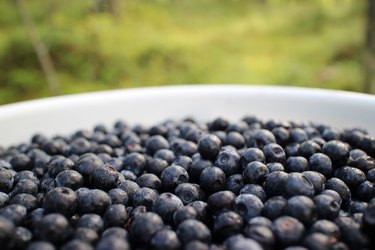
Fruits and berries have natural sugars in varying amounts, and these can impact your blood glucose. Without sacrificing the health benefits of fresh produce, understand how the natural fruit sugars in blueberries will impact your blood glucose so you can maintain your target readings while enjoying blueberries with a meal or snack. Pair them with foods that help reduce the glucose impact for the most protection against rapid glucose increases.
Carbohydrate Content
Video of the Day
Your body creates glucose from the carbohydrates that you eat and delivers the glucose to your cells for energy. Excess glucose that your cells do not use builds in your bloodstream, creating an increased blood glucose reading. A 1-cup serving of blueberries contains 27 grams of carbohydrates. Sugar contributes 11 grams of the carbohydrate content. The sugar in blueberries will metabolize rapidly, delivering a slight glucose increase.
Video of the Day
Fiber and Protein
Your body does not absorb dietary fiber, which means that the fiber content has no blood glucose impact. It takes more than 5 grams of carbohydrates to show a considerable blood glucose increase, so reduce the carbohydrate count by the dietary fiber content if there is more than 5 grams of fiber per serving. A cup of blueberries contains 3 grams of fiber, nearly 15 percent of your daily requirement. Blueberries contain little protein, only 1 gram per cup, but balancing blueberries with a lean protein, source such as low-fat cottage cheese, can help reduce the overall blood glucose increase because protein slows the rate at which your body absorbs carbohydrates.
Vitamin K Content
Vitamin K is needed by the body to help your blood clot when needed. MedlinePlus.com reports that the vitamin also helps keep bones strong as you age. If you take blood thinning medication it is important to know the vitamin K content of the foods you eat, as vitamin K will interfere with your medication's ability to work properly. A 1-cup serving of blueberries contains 28.6 micrograms of vitamin K, or almost 30 percent of the recommended intake of 90 micrograms per day.
Other Vitamins and Minerals
Blueberries are rich in antioxidants and contain 15 percent of your daily vitamin C requirement in each serving. Blueberries are an ideal snack despite the carbohydrate load due to the nutritional benefit. Consume them in moderation as part of a well-rounded meal for the most benefit. Add blueberries to your diet by eating a handful raw, or mix them with cottage cheese, yogurt, oatmeal, cereal or add them to your smoothies.
Is this an emergency? If you are experiencing serious medical symptoms, please see the National Library of Medicine’s list of signs you need emergency medical attention or call 911.